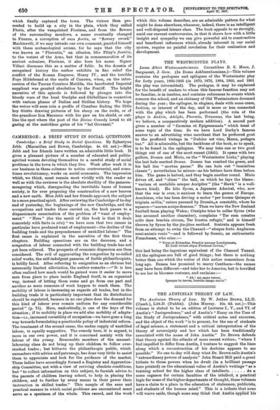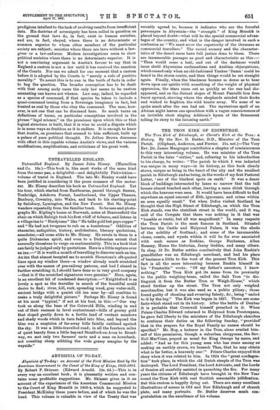THE AUSTINIAN THEORY OF LAW.
The Austinian Theory of Law. By W. Jethro Brown, LL.D. (Camb.), Litt.D. (Dublin). (John Murray. 10s. fid. net.)—This volume is stated to be an edition of Lectures I., V., and VI. of Austin's " Jurisprudence," and of Austin's " Essay on the Uses of the Study of Jurisprudence," with critical notes and excursus, and the object of the work "is to present, for the use of students of legal science, a statement and a critical interpretation of the theory of sovereignty and law which has been traditionally associated with the name of John Austin." Dr. Brown defends that theory against the attacks of more recent writers; "where I feel impelled to differ from Austin, I venture to suggest the lines along which a reconstruction of his doctrine appears to me possible." No one to-day will deny what Dr. Brown calls Austin's "extraordinary powers of analysis." John Stuart Mill paid a great tribute to those powers when he dwelt (in a brilliant passage here printed) on the educational value of Austin's writings " as a training school for the higher class of intellects ' As a mere organon for certain faculties of the intellect, a practical logic for some of the higher departments of thought, these volumes have a claim to a place in the education of statesmen, publicists, and students of the human mind." This is a tribute that none will waive aside, though some may think that 'Austin applied his prodigious intellect to the task of evolving results from insufficient data. His doctrine of sovereignty has been called in question on the ground that laws_ do, in feet, exist in human societies, and are, in fact, obeyed, where there is no determinate or eommon superior to whom other members of the particular society are subject; societies where there are laws without a law- giver or a law-enforcer. Modern investigations seem to show political societies where there is no determinate superior. It is not a convincing argument in Austin's favour to say that in England a custom is not a law until it has received the sanction of the Courts. Nor can we admit for one moment that a custom before it is adopted by the Courts is "merely a rule of positive morality." To assert this is to rim in the teeth of facts in order to beg the question. The broader conception has to be dealt with that among early races the only law seems to be custom emanating one knows not whence. Law may, indeed, be regarded as a species of command, if that species be taken to include a quasi-command issuing from a Sovereign imaginary in fact, but treated as real by those who obey the command. The case, how- ever, is not one that can be discussed here. So much turns on definitions of terms, on particular conceptions involved in the phrase "legal science," on the premisses upon which this or that logical structure is built, that it is wise to avoid a dispute which is in some ways as fruitless as it is endless. It is enough to know that Austin, on premisses that seemed to him sufficient, built up a palace of pure political thought. Dr. Jethro Brown discusses with effect in this capable volume Austin's views, and the various modifications, amplifications, and criticisms of his great work.



























































 Previous page
Previous page